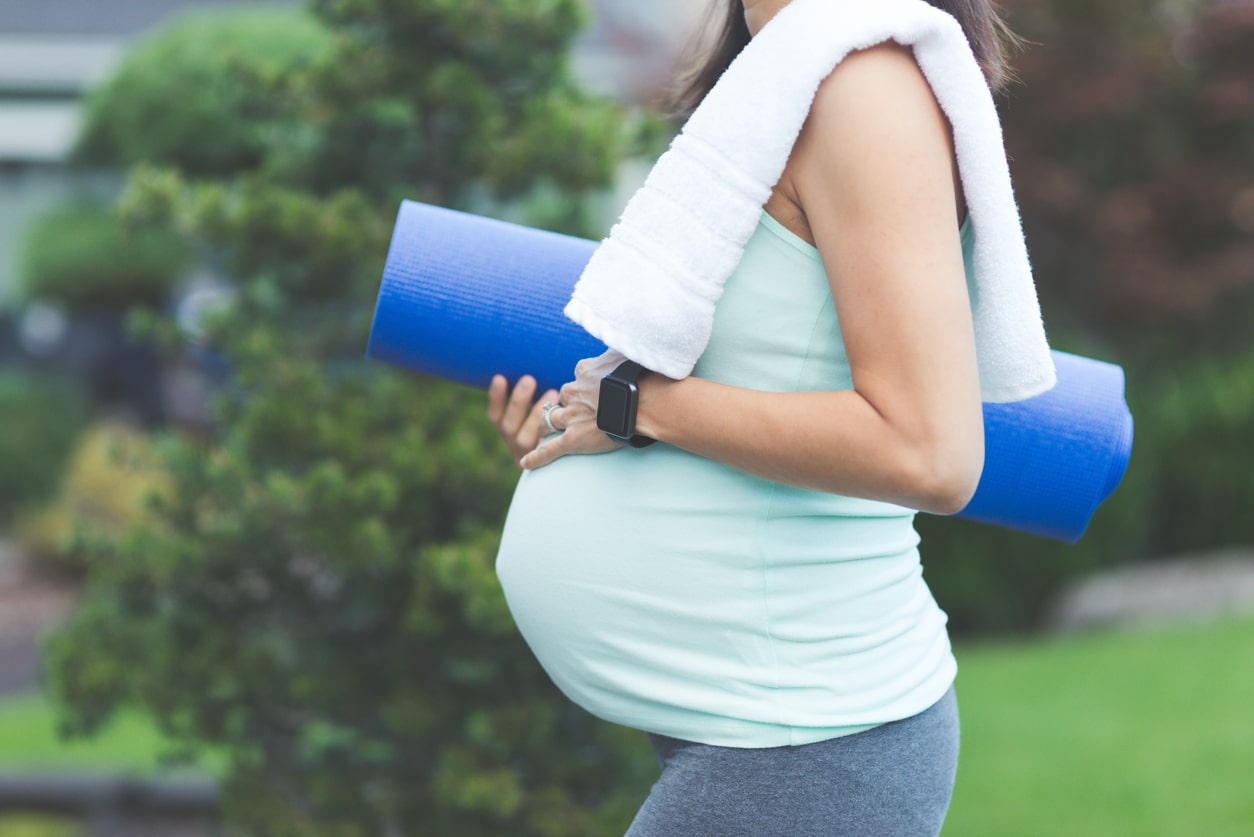Heavy Lifting When Pregnant: Physical Labor and Safety

Women are tough and hard-working individuals, and their bodies can perform amazing feats; however, some jobs and tasks may be too physically strenuous for pregnant women to continue. Physical strain, such as lifting too much weight and standing for long periods, could lead to preterm labor, low birth weight, ligament pain, decreased blood flow, and muscle strains like hernias.
Each pregnancy is different, so you will need to work with your healthcare provider to determine your risks and appropriate level of physical activity.
Physically Strenuous or Hazardous Work During Pregnancy
In most cases, standing for long periods and lifting in the first trimester are unlikely to cause any damage or be considered a risk. However, due to hormonal changes and the hard work your body is performing, fatigue may set in, making it challenging to maintain your pre-pregnancy stamina.
Each stage of pregnancy has its ups and downs and restrictions when it comes to lifting and strenuous activity. Rest when tired and maintain hydration during physical activity, such as work or exercise. Discuss your current level of physical activity with your doctor. A healthy level of exercise is beneficial, but this is not the right time to drastically increase your workout routine.
Regardless of your job or current exercise regime, there are a few things to keep in mind while pregnant and situations you should avoid or decrease when possible.
Avoid Long Periods of Standing While Pregnant
Cooks, nurses, flight attendants, sales clerks, servers, police officers, teachers, and other professions that keep people on their feet all day can cause strain on a pregnant woman’s back and legs.
Long hours of standing during the last half of pregnancy disrupt blood flow due to pressure from the growing uterus on the lower extremities. Standing for long continuous hours on the job might increase the mother's risk of developing high blood pressure and premature birth.
Women in high-risk pregnancies should discuss what they are physically capable of doing with their doctors. It may be necessary to seek reasonable accommodations to allow fewer hours on their feet or prevent heavy lifting.
If you have no health problems or pre-existing conditions and are experiencing a healthy pregnancy, there is no need to stop working. In many cases, you can work until your due date. However, sitting and elevating your legs when possible is advisable to relieve any back pain, leg aches, and swollen legs or ankles. Frequent position changes, such as taking short walks if you have a desk job, can also improve comfort.
Use Caution in Jobs that Require Physical Strength
Do you have to lift, push, bend, shove, and load materials all day? If you do, you may need to ask for a job reassignment or take medical leave during your pregnancy.
Heavy lifting is a concern during pregnancy, but what exactly does “heavy lifting” mean? Generally, it's agreed that pregnant women can lift items that weigh 25 pounds or under all day long without harm. Occasional lifting may include moving small boxes every so often or picking up an older child for a quick hug.
In early pregnancy, women can infrequently lift up to 36 pounds while using proper body mechanics, as long as they are otherwise healthy. This number decreases throughout pregnancy and as lifting becomes more frequent. If your job requires frequent lifting above this number, it will become necessary to seek accommodations or take medical leave.
It is also important to note that your center of gravity will shift as your belly extends, especially in your third trimester. This means that even if you can physically lift heavy objects, doing so could cause you to fall if not done correctly. Following proper body mechanics while lifting is vital to maintaining a healthy body during pregnancy.
Get Up and Move If You Do Desk or Computer Work

On the flip side, too much sitting can decrease blood flow, and pregnant women are more prone to blood clots. Thicker blood is our body’s natural defense against blood loss during delivery, and our growing uterus places additional pressure on the pelvic floor, decreasing blood flow to the legs.
Unless you are on absolute bed rest by your doctor, try to get up every hour and walk around for five minutes. Regular exercise while pregnant improves your overall health and decreases the risk of developing gestational diabetes and preeclampsia.
Some women worry about the effects of radiation from sitting in front of a screen all day. In the 1980s, certain studies suggested linking video display terminals (VDTs) and problem pregnancies.
Since that time, additional studies have been conducted on working in front of a computer screen and its connection to congenital disabilities and miscarriages. So far, there seems to be no relationship between the two. The level of radiation emitted from a computer is less than the level you receive from sunshine.
The actual risk of using a computer all day comes from the physical strain of sitting. For example, if you work at a computer terminal, you might be prone to eye, neck, wrist, arm, and back strain, especially during pregnancy.
To avoid these problems, you should take frequent breaks; find excuses to walk around every once in a while (frequent trips to the bathroom are the perfect cover).
While sitting at your desk, try stretching exercises to keep your muscles from cramping.
- Rotate your ankles.
- Shrug your shoulders up, back, and down.
- Roll your head forward and around.
- Bend forward at your waist, tense your back muscles, and relax.
- Sit up tall and throw your shoulders back.
- Try sitting on an exercise ball instead of a chair.
Additional Workplace Risks
In addition to long hours of standing or heavy lifting, some jobs expose pregnant women to chemicals and toxins that could be dangerous to the developing baby.
Working in Manufacturing While Pregnant
To judge your safety on the job, you mustneed to know what chemicals you are exposed to each daily. You have the right to this information by law, and your employer is obliged to tell you. In addition, the Occupational Safety and Health Administration (OSHA) lists several substances pregnant women should avoid because they can adversely affect their baby’s development.
- Aluminum
- Dimethyl
- Sulfoxide
- Alkylating agents
- Ethylene oxide
- Arsenic Lead
- Benzene
- Lithium
- Carbon monoxide
- Organic mercury compounds
- Chlorinated hydrocarbons
- Polychlorinated biphenyls
Your boss or union representative might be able to help you determine if you are at risk in your present position. You can also get helpful information from the National Institute for Occupational Safety and Health. If you discover that your job might endanger your baby’s health, you can request a transfer to another position or take an early leave if financially possible.
Working in Health Care While Pregnant
Working in the healthcare industry as a doctor, nurse, dentist, veterinarian, lab or diagnostic technician, etc., puts you in constant contact with bacteria and diseases. While this was a risk you took on when entering the career, now that you're pregnant, you may need to assess your exposure to determine what is safe for you and your baby.
Exposure to certain toxic chemicals used for sterilization of equipment, anesthesia gasses, radiation used for diagnostic and treatment purposes, and infections can be harmful to the fetus.
Take a look at what you are exposed to daily and talk to your doctor about any concerns. If you're worried about your baby’s health, ask to be reassigned to a safer position or consider taking an early leave of absence.
Exercising While Pregnant

In most instances, exercising, including light aerobic and gentle weight training, is encouraged during pregnancy. The American College of Obstetricians and Gynecologists (ACOG) recommends a regular exercise routine of three to five times a week, and states exercise is beneficial to a women’s health pre-pregnancy, while pregnant, and during the postpartum period.
If strength training, you may need to decrease your weight limits or the number of reps you perform; you may also have to sit for specific exercises as your pregnancy progresses since your center of gravity shifts.
Gentle exercise can relieve lower back pain; increase blood flow; improve your mood; help you sleep better; and decrease the risk of preterm birth, preeclampsia, and gestational diabetes.
Avoid using heavy weights, lying on your back in your third trimester, or performing new and tricky yoga poses that could cause you to lose your balance.
Discuss any exercise plans with your doctor and seek out classes and videos geared specifically towards pregnancy exercises to reduce risk.
Stay Healthy and Safe During Pregnancy
Physical activity and heavy lifting during pregnancy are generally safe in controlled amounts. Maintaining a certain amount of physical activity is even healthy for you and your baby. However, monitoring the amount of weight lifted and types of movement is essential to ensure your safety.

